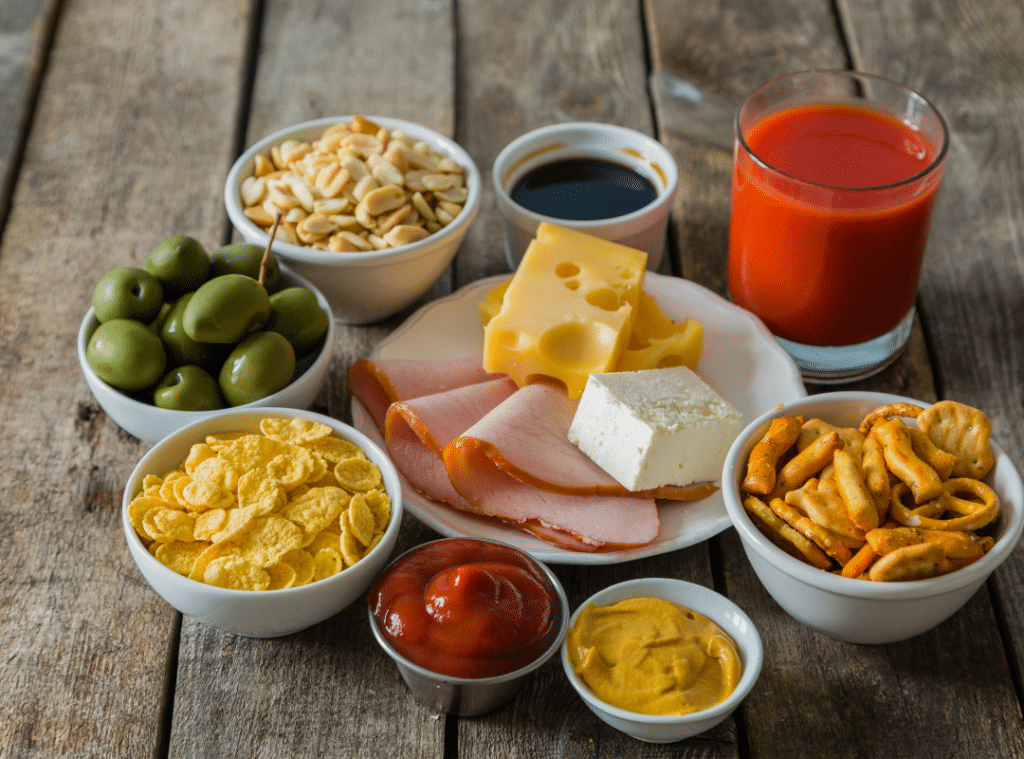Foods to Avoid After 60: A Guide to Smarter Dietary Choices
Like a wise old sage warning of hidden dangers, the foods you choose after 60 can significantly impact your health. It’s not just about what you eat; it’s about recognizing which items might quietly undermine your well-being. You might be surprised to learn that some seemingly innocent snacks and meals could contribute to chronic issues or weight gain. By knowing which foods to avoid, you can make choices that support a healthier, more vibrant life. What might those foods be, and how can you replace them with better options? At Westmont Village Homes, we believe that making informed dietary choices is essential for maintaining a fulfilling lifestyle in your golden years.

Empty Calories
Empty calories can be a significant concern for those over 60, as your metabolism naturally slows down with age. Foods that contain sugar and unhealthy fats, like potato chips, candy, and full-sugar sodas, provide little nutritional value while contributing to weight gain.
It’s crucial to identify these empty-calorie foods to avoid them effectively. Instead, focus on nutrient-dense alternatives that satisfy your cravings and enhance your overall health. For instance, consider swapping out sugary snacks for options like frozen fruit dipped in dark chocolate or baked kale chips.
Infused waters can replace sugary drinks, keeping you hydrated without the empty calories. Making these better food choices supports your well-being and sets a positive example for those around you. Additionally, proper nutrition is essential for senior health and well-being, as it strengthens the immune system and helps manage chronic diseases.
When you prioritize whole, nutritious foods, you’re not just serving yourself but contributing to a healthier community. Remember, it’s all about balance—indulging occasionally is fine, but consistently choosing healthier options is the key to thriving after 60.

Raw or Unpasteurized Foods
As you age, your immune system may become less effective, making it vital to be cautious about the foods you consume, incredibly raw or unpasteurized items.
These foods can harbor harmful bacteria that pose a significant risk for foodborne illnesses, particularly in seniors. To help safeguard your health, here are some foods to avoid after 60:
- Sushi with raw fish
- Soft cheeses (like Brie)
- Undercooked eggs
- Raw sprouts
- Unpasteurized milk or juices
When choosing alternatives, opt for items that have been cooked or pasteurized to eliminate pathogens.
For instance, enjoy sushi made with cooked fish, select hard cheeses like Cheddar, and make sure eggs are fully cooked. Incorporating microgreens instead of raw sprouts can also be a safe choice. Additionally, good nutrition is essential for maintaining a strong immune system as you age.

Grapefruit and Medications
Knowing how grapefruit can affect medications is vital when managing your health after 60. Grapefruit and medications often don’t mix well, as grapefruit juice can interfere with how your body metabolizes certain drugs.
It does this by blocking the CYP3A4 enzyme, which can lead to higher levels of medications in your bloodstream than intended. This can result in increased side effects or even toxicity.
If you’re taking medications for blood pressure, anxiety, or cholesterol, you must consult your healthcare provider about the potential risks of consuming grapefruit or grapefruit juice. While grapefruit isn’t unhealthy, moderation is key, especially if you’re on specific medications.
Instead of grapefruit juice, consider safer alternatives like orange juice, tomato juice, or cranberry juice to accompany your meals. Family involvement can also play a significant role in ensuring that you make informed dietary choices, especially when managing medications.
Always read medication labels for grapefruit warnings, and don’t hesitate to contact your pharmacist if you’re unsure. By being mindful of your diet and its interactions with medications, you can better support your overall health and well-being.

Fried Foods
Fried foods can pose serious health risks, especially as you age, increasing the likelihood of heart disease and other complications. Instead of reaching for that fried chicken or French fries, consider healthier cooking methods like grilling or steaming. Opt for nutrient-dense alternatives, such as baked sweet potato fries or grilled vegetables, to support your well-being without sacrificing flavor. Additionally, fiber-rich foods can enhance digestive health and prevent chronic diseases.
Health Risks Overview
Numerous studies indicate that consuming fried foods poses significant health risks, especially for older adults.
As a woman over 60, it’s essential to be mindful of how these foods impact your health. Fried foods are typically high in saturated fats and empty calories, which can contribute to severe conditions like heart disease and stroke.
Here are some specific risks to take into account:
- Increased risk of coronary artery disease
- Higher likelihood of heart attacks
- Potential for weight gain due to high-calorie content
- Greater chance of developing type 2 diabetes
- Link to inflammation and chronic diseases
Healthier Cooking Methods
Healthy cooking methods can significantly reduce the risks associated with fried foods, making it easier to maintain a nutritious diet. Considering foods to avoid after 60, it’s crucial to recognize how cooking techniques can impact your health. Instead of frying, try these healthier alternatives:
| Cooking Method | Description | Suggested Foods |
| Grilling | Cook food quickly over a flame, adding flavor without excess fat. | Chicken, vegetables, fish |
| Baking | Uses dry heat to cook food evenly, preserving nutrients. | Sweet potatoes, casseroles |
| Steaming | Retains nutrients and flavor by cooking with steam. | Broccoli, carrots, fish |
| Roasting | Enhances flavor and texture by cooking food in an oven. | Root vegetables, meats |
Fried foods often contain high levels of saturated fats and empty calories, which can lead to health issues. By choosing grilling, baking, steaming, or roasting, you’re enhancing the flavor and supporting your overall well-being. Remember, moderation is key—balancing indulgence with these healthier cooking methods can significantly affect your dietary choices after 60.
Nutrient-Dense Alternatives
Focusing on nutrient-dense options can significantly improve your overall health when considering alternatives to fried foods.
Fried foods are among the ten worst foods for seniors due to their high levels of saturated fats and empty calories. However, by shifting to healthier cooking methods and better food choices, you can enhance your diet while enjoying delicious meals.
Here are some nutrient-dense alternatives to fried foods:
- Baked sweet potato fries: A tasty and nutritious side with lower fat.
- Grilled chicken: Rich in protein and lower in calories than fried options.
- Oven-roasted vegetables: Full of vitamins, minerals, and flavor without the extra oil.
- Air-fried foods: Achieve a crispy texture with less oil, retaining nutrients.
- Zucchini noodles: A low-carb option that can replace traditional pasta with added fiber.

High-Sodium Foods
As you age, monitoring your sodium intake becomes increasingly important since high-sodium foods can lead to elevated blood pressure and fluid retention.
Foods to avoid after 65 include processed items like American cheese, lunch meats, and frozen meals, which are often loaded with salt. High sodium levels can increase one’s risk for heart disease and stroke, making it essential to choose alternatives.
To support your health, consider incorporating low-sodium options into your diet. For instance, opt for low-fat cheddar instead of processed cheese and choose unprocessed chicken breast over smoked meats.
Fresh or frozen vegetables without added salt make excellent side dishes, while herbs and spices can add flavor without the health risks associated with extra sodium.

Alcohol and Aging
Alcohol can markedly impact your health as you age, often leading to increased risks and complications. It’s vital to be mindful of how alcohol affects your body, especially if you’re managing medications or chronic conditions.
As you get older, your body processes alcohol differently, which can lead to a range of issues.
- Sleep disturbances
- Hypoglycemia
- Elevated blood pressure
- Liver and kidney problems
- Medication interactions
Moderation is key. For men, the recommendation is up to two drinks daily, while women should limit themselves to one. It’s essential to consult your healthcare provider about your alcohol consumption, particularly if you’re on medications that may interact negatively with alcohol.
Being aware of the effects of alcohol on your body helps you make informed choices. Remember, you can still enjoy social occasions without overindulging.
Consider alternatives like sparkling water or herbal teas to stay hydrated and healthy while socializing. Prioritizing your health means being proactive about your dietary choices, including your alcohol intake, to promote a better quality of life as you age.
Steering dietary choices after 60 can feel like navigating through a maze. At Westmont Village Homes, we believe that by avoiding empty calories, high-sodium foods, and raw items, you’re not just dodging pitfalls; you’re paving a path toward better health. Remember to be cautious with grapefruit if you’re on medications, and limit fried foods and alcohol. By prioritizing nutrient-dense options, you’ll help yourself flourish as you age, ensuring your golden years are vibrant and full of life. Make each meal count! For more tips and support, feel free to call us at 951-697-2060.
How Do The Costs Of Moving Into A Quality Senior Care Community Compare With The Costs Of Staying At Home?Compare The Costs of Senior Living vs Staying at Home
Frequently Asked Questions on Seniors and Healthy Eating
What should you avoid eating in your 60s?
As you age, it’s best to avoid foods high in trans fats, added sugars, and excessive sodium. These can increase the risk of heart disease, diabetes, and high blood pressure, which are more common in older adults. Opt for nutrient-dense foods that support overall health and vitality.
What fruits should seniors avoid?
Seniors should limit fruits high in sugar, such as grapes, mangoes, and dried fruits, especially if they have diabetes or need to control their blood sugar levels. Instead, focus on fruits like berries, apples, and citrus, which provide fiber and essential vitamins without excessive sugar.
What is the best diet for a 60-year-old?
A balanced diet for a 60-year-old should emphasize lean protein, whole grains, healthy fats, and plenty of fruits and vegetables. The Mediterranean or DASH diet is an excellent choice, as it promotes heart health, brain function, and overall wellness. Always consult a healthcare provider to tailor a diet to individual health needs.
Are bananas good for people over 60?
Yes, bananas are an excellent choice for seniors as they are easy to digest, provide potassium for heart health, and support muscle function. However, they should be eaten in moderation, especially for those monitoring blood sugar levels or managing weight.
What are the eight fatal foods for seniors?
While “fatal foods” may be exaggerated, certain foods pose higher risks for seniors, such as undercooked eggs or meat, unpasteurized dairy, processed meats, high-sodium snacks, sugary drinks, raw sprouts, and foods high in trans fats. These can increase the likelihood of foodborne illnesses or exacerbate chronic health conditions.
Do all ages have different food and drink preferences?
Yes, food and drink preferences often vary by age due to changes in taste, nutritional needs, and health conditions. For instance, children may prefer sweeter foods, while older adults may prioritize heart-healthy or easy-to-digest options. It’s essential to consider both individual and age-related preferences when planning meals.








